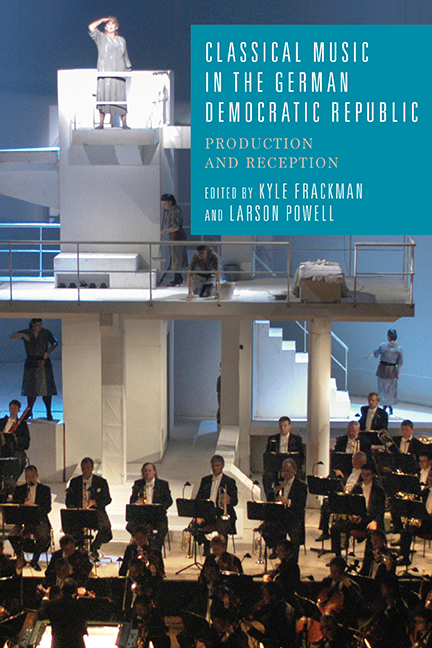Book contents
- Frontmatter
- Contents
- Acknowledgments
- List of Abbreviations
- Introduction: Music and Heritage in the German Democratic Republic
- 1 Provincialism, Modernity, and the Classical Heritage: The Administrative Structure of the GDR and the Situation of Music Production
- 2 Classicism as Anti-Fascist Heritage: Realism and Myth in Ernst Hermann Meyer’s Mansfelder Oratorium (1950)
- 3 Positioning Georg Knepler in the Musicological Discourse of the GDR
- 4 Ehrt euren Deutschen Meister: Reproducing Wagner in the GDR
- 5 The Embodiment of Collective Memory in Neue Odyssee
- 6 Marxism and Feminism in Ruth Berghaus’s Staging of Don Giovanni
- 7 Beyond the Gewandhaus: Mahler and the GDR
- 8 Hanns Eisler’s Funeral and Cultures of Commemoration in the GDR
- 9 Exile—Remigration—Socialist Realism: The Role of Classical Music in the Works of Paul Dessau
- 10 “What a Satisfying Task for a Composer!”: Paul Dessau’s Music for The German Story (. . .Du und mancher Kamerad)
- 11 Friedrich Schenker and the Third Way
- 12 A Prism of East German Music: Lothar Voigtländer
- Notes on the Contributors
- Index
6 - Marxism and Feminism in Ruth Berghaus’s Staging of Don Giovanni
Published online by Cambridge University Press: 21 May 2021
- Frontmatter
- Contents
- Acknowledgments
- List of Abbreviations
- Introduction: Music and Heritage in the German Democratic Republic
- 1 Provincialism, Modernity, and the Classical Heritage: The Administrative Structure of the GDR and the Situation of Music Production
- 2 Classicism as Anti-Fascist Heritage: Realism and Myth in Ernst Hermann Meyer’s Mansfelder Oratorium (1950)
- 3 Positioning Georg Knepler in the Musicological Discourse of the GDR
- 4 Ehrt euren Deutschen Meister: Reproducing Wagner in the GDR
- 5 The Embodiment of Collective Memory in Neue Odyssee
- 6 Marxism and Feminism in Ruth Berghaus’s Staging of Don Giovanni
- 7 Beyond the Gewandhaus: Mahler and the GDR
- 8 Hanns Eisler’s Funeral and Cultures of Commemoration in the GDR
- 9 Exile—Remigration—Socialist Realism: The Role of Classical Music in the Works of Paul Dessau
- 10 “What a Satisfying Task for a Composer!”: Paul Dessau’s Music for The German Story (. . .Du und mancher Kamerad)
- 11 Friedrich Schenker and the Third Way
- 12 A Prism of East German Music: Lothar Voigtländer
- Notes on the Contributors
- Index
Summary
MOZART's OPERA DON GIOVANNI has lent itself to a remarkable range of interpretations by opera directors—from the realism of Walter Felsenstein's staging at the Komische Oper in 1966 to the grotesque comedy of Yuri Lyubimov's 1982 production in Budapest. Within this diverse history, the production by East German choreographer Ruth Berghaus (1927–96) stands out as one of the first interpretations by a notable female director and the only one to combine a feminist and Marxist reading of the opera.
Don Giovanni was not Berghaus's first staging of an opera by Mozart. After a number of years at the Deutsche Staatsoper and the Berliner Ensemble in East Berlin, she began her tenure at the Frankfurt opera in West Germany with a production of Die Zauberflöte in 1980. The following year, she produced Idomeneo at the East Berlin Staatsoper and La clemenza di Tito in Mannheim in the spring; Die Entführung aus dem Serail premiered later that same year in Frankfurt. As with many of her productions, “the serious and comic are closely, and disturbingly, meshed.” Specifically in Don Giovanni, she focused on the libretto's designation as dramma giocoso rather than on Mozart's own label of the opera as opera buffa. Berghaus, however, translated the term literally, taking dramma to mean something dramatic and serious rather than applying the original meaning of “action.” She explains, “Die Beschreibung des Humors aus dem Programmheft von 1955 bestätigt uns den Widerspruch, der schon im Stücktitel steckt: DRAMMA GIOCOSO Das Tragödische ist von KOMÖDISCHEN nicht zu teilen. Mozart durchdringt den Spaß mit der Trauer, die Liebe mit dem Tod, die Heiterkeit mit der Rache, den Schrecken mit dem Vergnügen.” (The description of the humor from [Paul Dessau's essay published in the program book for a 1955 production of Don Giovanni] confirms the contradiction already is in the piece entitled DRAMMA GIOCOSO. The tragedy is not to be parted from comedy. Mozart penetrates the fun with the sadness, love with death, serenity with revenge, horrors with the delightful.)
- Type
- Chapter
- Information
- Classical Music in the German Democratic RepublicProduction and Reception, pp. 119 - 134Publisher: Boydell & BrewerPrint publication year: 2015
- 1
- Cited by



